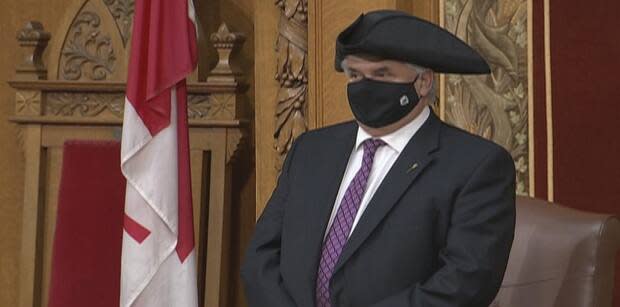Reducing spread of COVID-19 'top priority' of Sask. government's fall sitting
Amidst the province's worst spike in COVID-19 cases, the Saskatchewan government began the fall sitting of the legislature with a throne speech unlike any other in its history.
Lieutenant Governor Russ Mirasty delivered the government's speech in front of members all in masks, who sat at remodelled desks with plexiglass shields.
The speech started thanking the public for "working together" to fight the COVID-19 pandemic.
As of Monday, Saskatchewan was third among provinces in active cases per 100,000, trailing Alberta and Manitoba.
The government reminded people to continue to follow public health orders and guidelines.
"Saskatchewan has fared better than many places because our citizens have responded in characteristic fashion — with determination, resilience, strength and compassion."
It said the government is "profoundly grateful for the courage and commitment" of everyone working in the health care system.
The government also thanked workers, farmers, first responders and teachers for their efforts.
"Today, Saskatchewan is facing the most difficult moment of the pandemic to date. My government's top priority during this session and in the coming weeks will continue to be working to reduce the spread of COVID-19."
It said the government will protect lives and livelihoods.
"We can, and will, do both."
Opposition Leader Ryan Meili said the province may have fared better than other places at the start of the pandemic, but not anymore.
"Over 300 cases again today," Meili said "We are now over double what Quebec and Ontario have per capita cases. We're catching up to Alberta. We have outbreaks in long-term care. Our ICUs and emergency rooms are getting overwhelmed as the health authority is scrambling to recruit and train physicians and nurses to staff up field hospitals.," Meili said.
"This is not going well."
Election promises
The speech outlined the government's election commitments, which will be introduced over the two-week sitting and later in the spring.
It said the 10 per cent rebate of electricity charges will begin Tuesday.
The government's first bill of the sitting will be the Home Renovation Tax Credit, which allows homeowners to claim a 10.5 per cent tax credit on up to $20,000 of renovation expenses between Oct. 31, 2020 and Dec. 31, 2022.
The government will also reduce the small business tax rate from two per cent to zero.
Other promises include:
Create 750 licensed home-based child care spaces.
Provide funding to kids living with autism up to the age of 12.
Cover the cost of glucose monitoring up to 18 years old.
Reduce seniors' ambulance costs by 50 per cent.
Increase the post-secondary Sask. Advantage scholarship to $750 per year.
Meili slammed the throne speech, saying it was a missed opportunity to take urgent action to fight the second wave of COVID-19.
He said there was nothing in the speech to address health care shortages, overcrowded schools, those in poverty or help for struggling small businesses.

He said if a circuit-breaker approach had been enacted weeks ago to combat the pandemic, the number of COVID cases would already be coming down.
"Every day we don't act is an opportunity for the virus to spread," Meili said. "Scott Moe's inaction is putting lives and livelihoods at risk all across Saskatchewan."
Premier Scott Moe said it was prudent to focus on election promises in the throne speech.
"The people of this province provided this government with a mandate to deliver on and we are going to do that and do it very quickly," he said."
Moe said the speech did discuss the pandemic and how they are addressing it.
"We are addressing it on a day-by-day, week-by-week basis."
Moe said he believes the new restrictions announced last week will have an impact on the spread of the virus and the government is working with people across the province to see which supports are needed for the economy going forward.
Meili said the government should already have a plan in place to help businesses.
"Businesses are struggling now and have been for weeks," he said. "The fact there they're still dithering and taking time instead of taking action as these case numbers are rising is just another example of a government that is too slow to react to a very serious situation."
Meili said the speech offered no new supports for struggling businesses and no immediate investments to fight the pandemic.
"Businesses are being told to stay open while their customers are being urged to stay home: it's a recipe for economic disaster," said Meili. "Now the government's slow and contradictory approach has left our health care system in chaos — and things will only get worse if we do not act immediately to flatten the curve of COVID-19."
New legislation
The government plans to introduce legislation to "better protect Saskatchewan people."
The province will amend the Residential Tenancies Act to allow victims of sexual assault to unilaterally break their long-term rental leases.
The government also plans to introduce the Protection From Human Trafficking Act.
"This legislation will enable victims to obtain expedited protection orders, allow for the tough enforcement of those orders, and provide civil remedies including the seizure of property and bank accounts and the suspension of drivers' licences."
New speaker
The sitting began with the election of the Speaker. Saskatchewan Party MLA for Biggar-Sask. Valley Randy Weekes was elected on a secret ballot after five rounds of voting.
Weekes said he was "honoured and humbled" by the trust placed in him by his colleagues.
He is the 27th person to don the tricorn in Saskatchewan history.

Weekes edged out the previous speaker, Mark Docherty, on the final ballot. Docherty had held the position since March 2018. Four other Sask. Party MLAs ran for the position: Lisa Lambert, Hugh Nerlien, Greg Ottenbreit, and Nadine Wilson.
Weekes is one of three government MLAs who have served in the legislature since 1999.
He was the minister for rural and remote health from 2012 to 2014.


